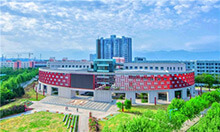武漢科技大學資源與環境工程學院安全工程專業簡介

武漢科技大學資源與環境工程學院安全工程專業簡介內容如下,更多考研資訊請關注我們網站的更新!敬請收藏本站,或下載我們的考研派APP和考研派微信公眾號(里面有非常多的免費考研資源可以領取,有各種考研問題,也可直接加我們網站上的研究生學姐微信,全程免費答疑,助各位考研一臂之力,爭取早日考上理想中的研究生院校。)
微信,為你答疑,送資源

武漢科技大學資源與環境工程學院安全工程專業簡介 正文
一、培養目標本專業培養能適應社會主義市場經濟建設需要,在德、智、體、美、勞等全面發展,具有社會職業素養、溝通合作意識、國際視野、學習和創新精神,了解安全科學與工程學科發展、掌握安全生產理論與技術、工業通風與防塵、消防安全技術與方法、安全應急管理和職業安全衛生等相關基礎理論、專業知識和基本技能,善于應用現代信息技術和管理技術,能夠在安全工程領域,從事安全科學研究、風險辨識與評價、安全技術研究與設計、安全監督與管理、安全檢測與監控、安全教育與培訓、應急管理與救援等工作的高素質應用型人才,期待畢業生五年左右達到以下目標:
1、具備扎實的數學、自然科學基礎知識,良好的人文素養、社會責任感和職業道德;
2、掌握安全科學與工程專業領域的基礎理論和專業知識,具有安全技術開發、安全工程設計、安全管理與培訓、安全評價、火災風險評估等方面的創新意識和工程實踐能力;
3、具有良好的表達和溝通能力以及團隊合作和組織管理能力,且能夠在一個團隊中作為骨干或者領導有效地發揮作用;
4、在安全管理、職業衛生、安全評價、火災風險評估等領域具有就業競爭力,并有能力進入研究生階段學習;
5、具有終身學習的意識,具備不斷學習和適應發展的能力;
6、具有一定的國際視野、交流與合作能力。
I.Training objectives
This major education can satisfy the need of socialist market economy construction, develop in morality, intelligence and physique etc., possess social professional quality, communication and cooperation, international view, learning and innovation consciousness, understand the development of safety science and engineering discipline, master the theory and technology of safety production, industrial ventilation and dust prevention, fire safety technology and method, safety emergency management and occupational safety and health related basic theories, professional knowledge and basic skills, good at application of modern information and management technology. The graduate will become high quality applied talents in the field of safety science, risk identification and evaluation, security technology research and design, safety supervision and management, safety inspection and monitoring, safety education and training, emergency management and rescue. After five years, graduates will achieve the following goals:
Graduates of this major are supposed to achieve the following aims after five years:
1. Possessing basic knowledge of mathematical and natural science, good humanistic accomplishment, social responsibility and professional ethics.
2. Mastering the basic theory and professional knowledge in the field of safety science and engineering, and having the innovative consciousness and engineering practice ability in safety technology and engineering design, safety management and training, safety assessment, fire risk assessment, etc.
3. Having well expression and communication ability, as well as teamwork and organizational management skills, and being able to be a core member or a leader in a team.
4. Being competitive in the fields of safety management, occupational health, safety assessment, fire risk assessment, etc, and are qualified to further study after the graduation.
5. Having a sense of lifelong learning and development adaptive ability.
6. Having the ability of international vision, communication and cooperation.
二、畢業要求
1、工程知識:能夠將數學、自然科學、工程基礎和專業知識用于解決安全工程領域復雜工程問題。
2、問題分析:能夠應用數學、自然科學和工程科學的基本原理,識別、表達、并通過文獻研究分析安全工程等專業領域復雜工程問題,以獲得有效結論。
3、設計/開發解決方案:能夠針對安全工程專業領域復雜工程問題提出解決方案,設計滿足特定需求的系統、單元(部件)或工藝流程,并能夠在設計環節中體現創新意識,考慮社會、健康、安全、法律、文化以及環境等因素。
4、實驗設計與信息處理:能夠基于科學原理并采用科學方法對安全工程領域復雜工程問題進行研究,包括設計實驗、分析與解釋數據、并通過信息綜合得到合理有效的結論。
5、現代工具的應用:能夠針對安全工程領域復雜工程問題,開發、選擇與使用恰當的技術、資源、現代工程工具和信息技術工具,包括對復雜工程問題的預測與模擬,并能夠理解其局限性。
6、工程師社會責任意識:能夠基于工程相關背景知識進行合理分析,評價安全工程領域工程實踐和復雜工程問題解決方案對社會、健康、安全、法律以及文化的影響,并理解應承擔的責任。
7、環境和可持續發展:能夠理解和評價針對復雜工程問題的安全工程及相關專業工程實踐對環境、社會可持續發展的影響。
8、職業道德與規范:具有人文社會科學素養、社會責任感,能夠在安全工程及相關工程實踐中理解并遵守工程職業道德和規范,履行責任。
9、團隊合作:能夠在多學科背景下的團隊中承擔團隊成員以及負責人的角色。
10、溝通:能夠就安全工程領域復雜工程問題與業界同行及社會公眾進行有效溝通和交流,包括撰寫報告和設計文稿、陳述發言、清晰表達或回應指令。并具備一定的國際視野,能夠在跨文化背景下進行溝通和交流。
11、項目管理:理解并掌握安全工程領域管理原理與經濟決策方法,并能在多學科環境中應用。
12、終身學習:具有自主學習和終身學習的意識,有不斷學習和適應發展的能力。
II.Requirements
1. Engineering knowledge: With the ability of using mathematics, natural sciences, basic and professional knowledge in engineering to solve complex engineering problems in the field of safety engineering.
2. Problem analysis: Identifying, expressing, and analyzing the complex engineering problems in safety engineering area with the literature research methods to obtain effective conclusions, basing on the application of basic principles of mathematics, natural sciences and engineering science.
3. Design / develop solutions: Providing solutions solve the complex problems in the field of safety engineering. Designing systems, units (components) or processes meet specific needs. With the ability of embodying innovation awareness as well as the factors of society, health, safety, law, culture, environment, etc, in the designing process.
4. Experimental design and information processing: Researching complex engineering problems in the field of safety engineering by scientific methods based on scientific principles, including experiments designing, data analysis and interpretation, to obtain reasonable and effective conclusions through comprehensive information analysis.
5. Using modern tools: With the ability of developing, selecting and using appropriate technologies, resources, modern engineering tools, information technology tools to solve complex engineering issues in the field of safety engineering, including the prediction and simulation of complex engineering problems and understanding its limitation.
6. Engineers’ sense of social responsibility: With the ability of making reasonable analysis based on the relevant engineering background, to evaluate the impact of the engineering practice and complex engineering solutions in the field of safety engineering on society, health, safety, legal and culture as well as understanding the corresponding responsibility.
7. Environment and sustainable development: With the ability of understanding and evaluating the impact of safety engineering and related professional engineering practices of complex engineering problems on the environmental and social sustainable development.
8. Professional ethics and norms:With high sense of humanities and social science literacy, social responsibility, understanding and observing engineering ethics and norms in safety engineering and related engineering practice.
9. Individual and team:Be able to play a role as a team member or a team manager in multi-disciplinary environment.
10. Communication:Be able to communicate effectively with industry peers and the public on complex engineering issues in the field of safety engineering, including writing reports, designing documents, presenting statements, clearly expressing or responding to directives. Communicating and exchanging ideas within the cross-cultural background with international perspective.
11. Project management:With the ability of understanding and mastering the management principles and economic decision-making methods in the field of safety engineering, and be able to apply them in multi-disciplinary environment.
12.Lifelong time learning:With the sense of independent learning and lifelong time learning awareness, as well as the continuous learning and development adaptive ability.
武漢科技大學
添加武漢科技大學學姐微信,或微信搜索公眾號“考研派小站”,關注[考研派小站]微信公眾號,在考研派小站微信號輸入[武漢科技大學考研分數線、武漢科技大學報錄比、武漢科技大學考研群、武漢科技大學學姐微信、武漢科技大學考研真題、武漢科技大學專業目錄、武漢科技大學排名、武漢科技大學保研、武漢科技大學公眾號、武漢科技大學研究生招生)]即可在手機上查看相對應武漢科技大學考研信息或資源。


本文來源:http://m.btfokj.cn/wuhankejidaxue/yanjiushengyuan_315106.html
推薦閱讀
-

武漢科技大學(4212)考點2022年碩士研究生網上報名須知
根據教育部《年全國碩士研究生招生工作管理規定》和湖北省教育考試院《年湖北省碩士研究生考試網上報名須知》要求,為做好我校年碩士研究生考試報名工作,現就有關事項公告如下:一、總……
日期:09-29 閱讀量:23465 -

武漢科技大學研究生學費標準
學制和學費標準學制:年社會工作、國際商務(全日制)專業學制年。學費:各招生專業學費標準以湖北省物價局審批為準。……
日期:07-29 閱讀量:21563 -

武漢科技大學研究生獎學金評定辦法
第一章總則第一條為了貫徹黨和國家的教育方針,促進研究生德、智、體、美全面發展,培養社會主義事業合格建設者和可靠接班人,根據教育部《普通高等學校學生管理規定》,結合我校實際情……
日期:07-29 閱讀量:23789 -

2021考研武漢科技大學文法與經濟學院擬錄取研究生名單公示
近日,研究生擬錄取名單已出。考研的同學們有沒有關注?今天考研派小編就整理了武漢科技大學文法與經濟學院年碩士研究生招生考試擬錄取名單的相關內容,希望能對大家有所幫助。點開此鏈……
日期:06-02 閱讀量:2817 -

2021考研武漢科技大學恒大管理學院擬錄取研究生名單公示
恒大管理學院年碩士研究生復試名單公示掛網恒大管理學院年碩士研究生復試名單公示……
日期:06-02 閱讀量:22622 -

2021年武漢科技大學博士研究生復試錄取通知
依據教育部相關文件精神,按照按需招生、全面衡量、擇優錄取、寧缺毋濫的原則,結合當前疫情防控要求和學校實際,特制定我校年博士研究生復試錄取工作方案。一、組織工作學校研究生招生……
日期:05-13 閱讀量:21333 -

武漢外語外事職業學院機電技術學部簡介
機電技術學部是武漢外語外事職業學院主要的工科學部,在學院的正確領導下,以特色建系,持續發展為指導思想,以質量樹信譽,以特色創優勢,以人才創品牌,力爭年建成外院一流的工科系。……
日期:06-02 閱讀量:21170 -

武漢外語外事職業學院醫學部簡介
、學部概況武漢外語外事職業學院于年經湖北省人民政府批準成立,并經國家教育部備案,屬專科層次全日制普通高校。學院與武漢科技大學城市學院共一個投資方,共一個校區,共享所有資源。……
日期:06-02 閱讀量:24649 -

武漢外語外事職業學院信息技術學部數字媒體應用技術簡介
一、廣告設計與制作方向、培養目標培養適應平面設計、動畫制作、網頁設計等工作需要,具有較扎實的廣告專業基礎理論知識和職業素質,掌握廣告設計、制作、策劃、網頁設計、動畫制作等知……
日期:06-02 閱讀量:22431 -

武漢外語外事職業學院信息技術學部計算機應用技術專業簡
一、軟件信息技術方向、培養目標培養學生掌握計算機應用技術的專業知識與基本技能,培養能夠達到軟件企業要求掌握軟件設計與開發的主流技術、符合企業要求的高素質技能型專門人才。該專……
日期:06-02 閱讀量:22250 -

武漢外語外事職業學院信息技術學部軟件技術專業介紹
軟件開發方向、培養目標培養具有扎實的計算機基礎知識和現代軟件工程的基本理論及專業知識;掌握計算機應用軟件的分析、設計和開發方法;掌握主流軟件開發平臺和軟件開發技術;熟練使用……
日期:06-02 閱讀量:24584 -

武漢外語外事職業學院信息技術學部簡介
信息技術學部是武漢外語外事職業學院重點學部之一,開設有計算機應用技術、數字媒體應用技術和軟件技術三個專業,在校學生人。畢業生就業率保持在以上,遍布北京、上海、廣州、深圳、杭……
日期:06-02 閱讀量:23813 -

武漢外語外事職業學院旅游與管理學部空中乘務專業簡介
專業名稱:空中乘務一、培養目標本專業培養適應民用航空業發展需要,掌握客艙服務、民航地面服務及相關崗位群工作必備的專業基礎知識,具備民航客艙服務、民航地面服務必備的專業技術技……
日期:06-02 閱讀量:24319 -

武漢外語外事職業學院旅游與管理學部國際郵輪乘務管理簡
專業名稱:國際郵輪乘務管理一、培養目標根據國際豪華郵輪公司的選聘要求和當今的國際服務業人才需求形式,以培養具有國家承認的大專學歷的專業人才,將學員培養為英語溝通能力強,具有……
日期:06-02 閱讀量:24863 -

武漢外語外事職業學院旅游與管理學部旅游管理專業簡介
專業名稱:旅游管理一、培養目標本專業培養適應新形勢旅游企事業單位需要的高素質服務與管理類專門人才。具有旅游管理專業知識,較好的思想道德品質和綜合素質,具備較強的綜合職業能力……
日期:06-02 閱讀量:22712 -

武漢外語外事職業學院旅游與管理學部簡介
旅游與管理學部是武漢外語外事職業學院最具鮮明職業特色的學部之一。學部現有省級特色專業、省級實習實訓基地、省級職業教育技能名師工作室。學部定位:具有較高水平實踐教學能力和科研……
日期:06-02 閱讀量:22625 -

武漢外語外事職業學院應用外國語學部專業簡介
專業名稱:應用英語專業方向:雙語幼師一、培養目標本專業培養適應社會主義經濟和社會發展需要,具有扎實的英語語言基礎,掌握學前教育的專業知識和能力,能在兒童教育機構以及中小學等……
日期:06-02 閱讀量:21123 -

武漢外語外事職業學院應用外國語學部簡介
應用外國語學部下設三個系:應用英語系、歐亞語言系、高職英語與職業技術教學中心,現有旅游英語、應用英語、商務英語、商務日語、商務法語、應用韓語、應用西班牙語、應用阿拉伯語等八……
日期:06-02 閱讀量:24886 -

武漢外語外事職業學院財經與商貿學部簡介
財經與商貿學部設有財會金融系、物流商貿系和綜合實驗室三個教學機構。學部現有財會、金融、物流、商貿四個專業群七個專業,分別是會計包括:會計、注冊會計師、稅務會計三個專業及專業……
日期:06-02 閱讀量:23779 -

武漢外語外事職業學院建筑工程技術學部專業簡介
專業名稱:工程造價一、培養目標:本專業培養適應國家經濟和社會發展需要,德、智、體全面發展,掌握工程造價學科的基本理論、基本方法和基本技能,具備從事工程造價項目規劃、設計與管……
日期:06-02 閱讀量:24292

















































